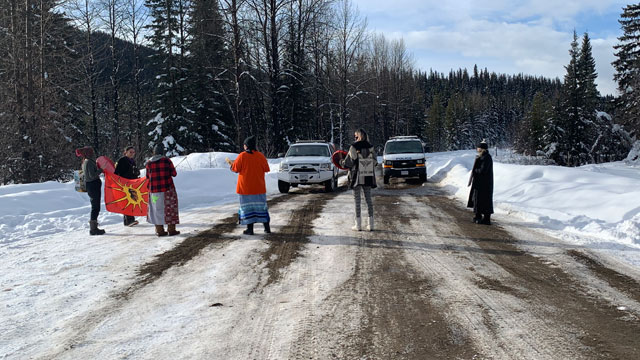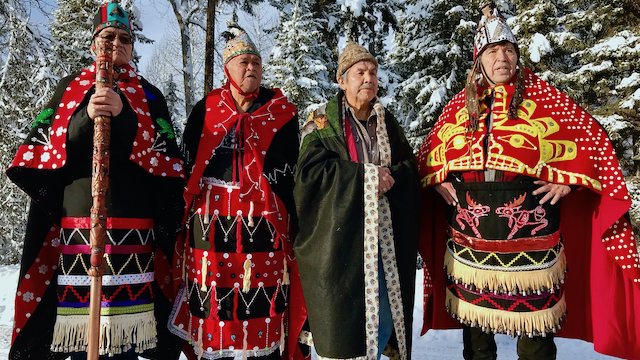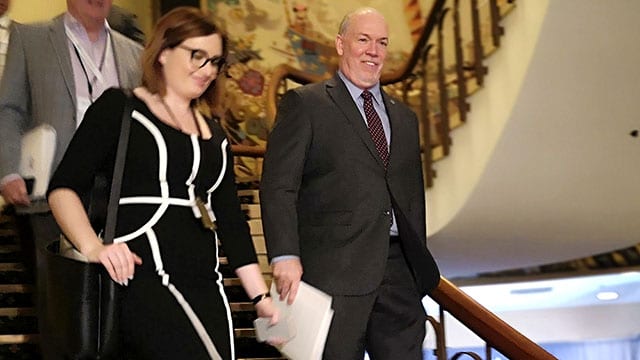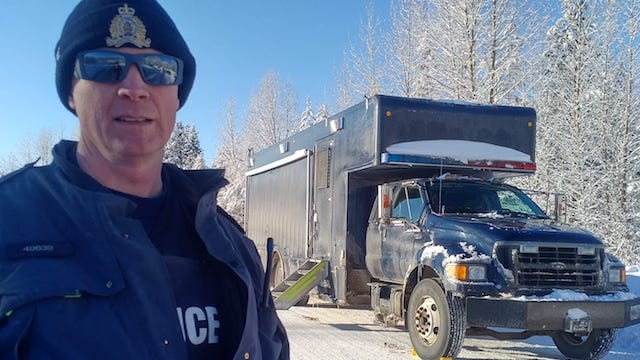RCMP say enforcement of the B.C. court injunction ‘nears’ on Wet’suwet’en territory
National News | February 5, 2020 by APTN National News

People from the Wet’suwet’en camp stand in front of the RCMP cars stationed on the Morice River Rd. Photo: Lee Wilson/APTN
APTN News
The RCMP in British Columbia say that people in the camps in the disputed area on the unceded Wet’suwet’en territory can choose to leave on their own, or be arrested.
The Mounties said at a news conference Wednesday they have no choice but to enforce a Dec. 31 injunction handed down by a B.C. court.
The police said people who are arrested will be taken away without handcuffs, or carried out if needed.
“We have chosen to followed a measured approach that has included over five weeks of discussions with the effected parties,” said RCMP Assistant Comm. and Criminal Operations Officer Eric Stubbs.
“As enforcement of the injunction nears, we have assembled a team in the area. If there are arrests to be made, there are peaceful options that will require a minimal use of force.”
Stubbs said people can voluntarily be arrested an no handcuffs will be used or they can be carried out.
But he also issued a warning.
“If those scenarios do not occur, our members will respond to the behaviors presented before them.”
For weeks, RCMP helicopters have been flying overhead and a police checkpoint limits access to the region that hereditary chiefs say they hold sole title to the unceded lands and do not support the pipeline.
Talks that were intended to de-escalate a dispute over Coastal GasLink’s 670 km pipeline that will carry fracked natural gas from Dawson Creek in north eastern British Columbia to the Kitimat on the coast have failed after just two days.
Hereditary chiefs of the Wet’suwet’en Nation said they had agreed to seven days of negotiations with the provincial government in hopes of reaching a peaceful resolution that would avoid RCMP enforcement of an injunction on the First Nation’s traditional territory.
Hereditary Chief Woos, who also goes by Frank Alec, said Wednesday he expects enforcement of an injunction in the disputed area is now “imminent.”
Woos said the talks were modeled around the nation’s “Wiggus” process, named for a word that loosely translates to “respect.” The process is rooted in trust and honesty and involves looking at issues together rather than beginning in oppositional positions.
The chiefs raised concerns during the meetings about the RCMP’s growing presence in the region, which Woos estimated has included 60 to 100 officers congregating in neighbouring towns and regular fly overs of the disputed area.
Indigenous Relations Minister Scott Fraser and Woos both said Wednesday the talks were respectful but unsuccessful.
“All of us are concerned about safety so that’s one of the common themes,” Fraser said in an interview from the airport in Smithers, the town where the meetings were held.
“What I was hoping that we all could agree to was even a temporary access protocol agreement similar to what was in place a year ago and to allow the company access, which is what the courts had ordered basically in its injunction.”
Fourteen people were arrested more than a year ago when RCMP enforced an injunction that allowed pre-construction across Wet’suwet’en territory for the $6.6-billion natural gas pipeline, a key part of the provincially approved $40-billion LNG Canada development.
Following the enforcement, the chiefs reached a deal to allow workers temporary access to the site.
Fraser said the chiefs asked if the province would withdraw the environmental certificate it granted Coastal GasLink, but he said that wasn’t an option.
“I explained that the project was given the OK in 2018. The project is underway, the courts have affirmed that the company has the legal right to work in the territory, so we had frank discussions about all of that.”
After the B.C. Supreme Court granted Coastal GasLink an expanded injunction, Wet’suwet’en hereditary chiefs responded by issuing the company an eviction notice in early January, arguing the company was violating traditional Wet’suwet’en laws.
There has been increasing tension since then, with RCMP saying traps “likely to cause bodily harm,” including notched trees and stockpiles of fuel, had been found along a forest service road leading to the pipeline construction area.
When the talks were announced last Thursday, RCMP said they would not take action to enforce the injunction by removing obstructions on the forest service road for seven days.
E Division commanding officer Deputy Comm. Jennifer Strachan said ending the protest without violence is their main goal.
“We, the RCMP, share that concern and believe there are ways for safe, peaceful and lawful discourse or dissent without violence.”
Police didn’t say when officers would move to enforce the injunction.
Both Woos and Fraser said they are open to continued dialogue, however Woos said it should include Premier John Horgan, three more cabinet ministers and RCMP commissioner Brenda Lucki _ a suggestion that Fraser said is unlikely in the near future on the government’s end given that Parliament is back in session next week.
Coastal GasLink said in a statement that its senior leadership team has been in Smithers since Sunday to meet with the chief if required but were unable to do so.
The company needs to quickly resume construction activities in the area to meet the project schedule, it said.
“Coastal GasLink appreciates the time, effort and energy taken by Minister Scott Fraser and his staff, the Hereditary chiefs of the Wet’suwet’en and liaison Nathan Cullen to try and find a peaceful resolution to the issues at hand,” the company said in a statement.
“We are disappointed that discussions have ended without a resolution that would prevent the enforcement of the interlocutory injunction.”
news@aptn.ca @aptnnews
-with files from the Canadian Press
Wet’suwet’en hereditary chiefs agree to a week of ‘respect’ talks with B.C.
National News | January 31, 2020 by Brett Forester

(Hereditary Chief Na’Moks, left, with other Wet’suwet’en
Nation hereditary chiefs in 2018. Photo: APTN File.
Brett Forester
APTN News
Brett Forester
APTN News
Eight hereditary chiefs of the Wet’suwet’en Nation agreed on Thursday to undertake seven days of talks with the British Columbia government with the goal of de-escalating a standoff over a controversial pipeline.
In a statement, the chiefs said they remain committed to peace and “will pursue all avenues to achieve a peaceful resolution.”
The talks will be called “Wiggus,” which the chiefs defined as “respect for all living-beings, starting with oneself.”
David Pfeiffer, president of Coastal GasLink (CGL), and the B.C. premier’s office also issued a statement welcoming the talks.
“This Wiggus/Respect Table is an opportunity for all parties to work in good faith towards de-escalation, and we view this announcement as a positive sign that all involved are determined to find a peaceful resolution,” the statement said.
Premier John Horgan will not attend the discussions.
The chiefs previously refused to meet with B.C. because Horgan chose to send Indigenous Affairs minister Scott Fraser in his place, saying they wanted to meet decision-maker to decision-maker. Horgan then appointed NDP MP Nathan Cullen as a liaison.
The hereditary chiefs assert that they have jurisdiction over their unceded traditional territory, and say construction of the $6.6-billion pipeline cannot proceed without permission from the chiefs through whose territory the proposed 670-kilometre route passes.
They issued an eviction notice to the company earlier this month as an assertion of this jurisdiction.
The completed project would carry fracked natural gas from Dawson Creek to an LNG export facility near Kitimat, B.C.
CGL has negotiated 20 benefit agreements with all elected First Nation governments along the route.
The province has signed agreements with all 20 elected governments as well.

(B.C. Premier John Horgan. Photo: APTN File.)
Read More:
‘We’ve got a real divide in the community:’ Wet’suwet’en Nation in turmoil
B.C. Supreme Court granted the pipeline company an interlocutory injunction on Dec. 31.
The judge ruled that the project has all the required permits and authorizations to proceed.
The ruling included an order for the RCMP to remove any obstructions and arrest anyone police have “reasonable or probable ground” to believe has knowledge of the order and is contravening it.
The Mounties said they will respect the talks and not take action to enforce the injunction by removing obstructions on the Morice West Forest Service Road leading to the company’s work sites.
“While additional resources may be noted in the Smithers-Houston area, the resources will be on standby during the seven-day period,” the statement said, referring to growing police presence.
Earlier Thursday, the hereditary chiefs and their supporters called for a public investigation into the way the RCMP is controlling access along the road.
The RCMP has said it set up a checkpoint along the Morice West Forest Service Road south of Houston to prevent the dispute from escalating after patrol officers discovered hazards along the road.
But the chiefs along with the B.C. Civil Liberties Association and the Union of B.C. Indian Chiefs allege that the Mounties are unlawfully restricting access on Wet’suwet’en traditional territory.
“We cannot be criminalized for using our law to access our lands, our foods, our medicine, our way of life,” said Chief Na’Moks, who dialled into a news conference in Vancouver.
RCMP arrested 14 people when it enforced a temporary injunction last year. The people have since been released, but RCMP was criticized internationally after it was reported that heavily armed Mounties were prepared to use lethal force in deconstructing the barricade.
On Wednesday in Prince George, Horgan said he believes the hereditary chiefs will come around.
“I don’t expect the leadership to say tomorrow that they love the pipeline. That’s not my expectation. But there needs to be a legitimate understating that the majority of the people in the region are going to benefit for this, and that’s what dialogue will produce.”
Na’Moks (John Ridsdale), hereditary chief of the Tsayu Clan, has said the pipeline will never receive consent from leaders of the traditional governance system.
“We will never change our mind on this project, we are the law of the land, we are following our law,” he said.
bforester@aptn.ca
@BrettForester
With files from the Canadian Press
RCMP pipeline checkpoint ‘arbitrary and discriminatory,’ says Wet’suwet’en hereditary chief, UBCIC
National News | January 30, 2020 by The Canadian Press

RCMP also shut down an access road and barred media
from passing while the police’s paramilitary and tactical
units raided the Gidimt’en camp in Jan. 2019.
Photo: Kathleen Martens/APTN.
The Canadian Press
The Wet’suwet’en hereditary clan chiefs and their supporters want a public investigation into the way the RCMP are controlling access along a rural road in northern British Columbia.
The RCMP have said they set up a checkpoint along the Morice Forest Service Road south of Houston in order to prevent a dispute over the Coastal GasLink pipeline from escalating.
But the chiefs along with the B.C. Civil Liberties Association and the Union of British Columbia Indian Chiefs (UBCIC) allege that the Mounties are unlawfully restricting access on Wet’suwet’en traditional territory.
“We cannot be criminalized for using our law to access our lands, our foods, our medicine, our way of life,” said Chief Na’moks, who dialled into a news conference Thursday.
The coalition has submitted a complaint to the Civilian Review and Complaints Commission for the RCMP, asking the chairperson to initiate a policy complaint and public interest investigation.
The RCMP could not immediately be reached for comment.
Harsha Walia, executive director of the Civil Liberties Association, says the application of the RCMP’s enforcement at the checkpoint has been “inconsistent, arbitrary and discriminatory.”
Walia says the coalition has submitted eight first-hand accounts from people turned away as part of the complaint. Some were told only lawyers licensed to practise in B.C. would be allowed through, or only hereditary chiefs on a pre-approved list.
“RCMP officers at the checkpoint have cited a range of inconsistent and shifting policies and procedures to those who are turned away,” she said at a news conference Thursday.
“Most of these do not in any way correlate to the stated goal of public safety.”
Officers check and record the identification of each person who arrives at the checkpoint, she said.
Irina Ceric, a non-practising lawyer who tried to visit supporters at a camp beyond the checkpoint, said she was turned away one day because she didn’t have a two-way radio and tire chains but she was allowed through the next day with no questions from a different officer about her equipment.
The B.C. Supreme Court granted Coastal GasLink an injunction on Dec. 31. It called for the removal of any obstructions including cabins and gates on any roads, bridges or work sites the company has been authorized to use.
It also gives authorization to the RCMP to arrest and remove anyone police have “reasonable or probable grounds” to believe has knowledge of the order and is contravening it.
The RCMP have said there is also a criminal investigation underway into traps likely to cause bodily harm after patrol officers found felled trees along the road, and piles of tires with jugs of accelerant and fuel-soaked rags nearby.
Na’moks said the chiefs continue to meet with RCMP Deputy Commissioner Jennifer Strachan, who has declined multiple interview requests.
Na’moks alleges that Strachan has called enforcement by the RCMP in the area “inevitable.”
“They are going to move in again, it is inevitable, is her words,” he said.
But he said they are in a holding pattern since the appointment of former New Democrat MP Nathan Cullen as provincial liaison tasked with de-escalating the dispute.
“Right now we are on pause.”
news@aptn.ca
@aptnnews
No comments:
Post a Comment